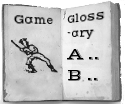Aleut Baseball
| Game | Aleut Baseball |
|---|---|
| Game Family | Baseball |
| Location | Alaska |
| Regions | US |
| Eras | Contemporary, Derivative |
| Invented | No |
| Tags | |
| Description | Aleut Baseball, called a "Sugpiat novelty," has been played on the Kenai Peninsula of Alaska. The Sugpiat are a Native population. Although called baseball, its rules resemble the Russian game lapta, and players point out that the game differs from modern baseball in having only two safe-haven bases, retiring runners by throwing at them, and lacking a strike-out rule. The area was once a Russian colony, and hundreds of residents are reportedly of Russian descent. An airplane landing strip was the site of a game observed in 2007 and described in 2010. The game is associated locally with Easter Sunday, with some games played in the dawn light after Easter services. Attributes of Aleut baseball include: [] there are no umpires [] two large safe zones for runners at the ends of the field [] two "home" areas for batting near the ends of the field [] sides take turns batting [] runners score one points when reaching an opposing base, and another for a safe return. [] multiple baserunners after any hit ball [] caught flies put the side out. [] soft tosses to batters [] baserunners can pick up balls thrown at them and try to plug members of the fielding side [] games can last several hours. Some games end when one side passes an agreed number of points (runs).
Schoolchildren play a form of kickball resembling Aleut baseball, using kicked rubber balls in place of batted tennis-style balls.
|
| Sources | M. DeHass and A. Droulias, "Aleut Baseball: Cultural Creation and Innovation Through a Sporting Event," Études/Inuit/Studies 342 (2010), pp. 21–37. |
| Source Image | [[Image:|left|thumb]] |
| Comment | Edit with form to add a comment |
| Query | Can we discover the geographic range of play of this game? Do local variations exist in Alaska? Edit with form to add a query |
| Has Supplemental Text |
Comments
<comments voting="Plus" />
